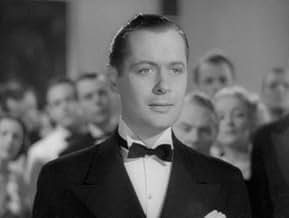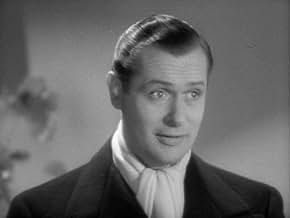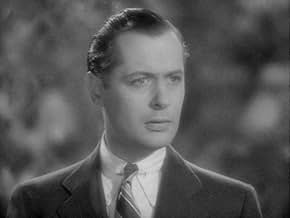PUNTUACIÓN EN IMDb
6,0/10
979
TU PUNTUACIÓN
Añade un argumento en tu idiomaA society girl tries to reform her playboy husband by making him jealous.A society girl tries to reform her playboy husband by making him jealous.A society girl tries to reform her playboy husband by making him jealous.
- Premios
- 3 premios en total
Charles Ruggles
- Edgar
- (as Charlie Ruggles)
Joan Fontaine
- Caroline
- (as Joan Burfield)
John David Horsley
- Duffy
- (as David Horsley)
E.J. Babille
- Desk Clerk
- (as E.J. Babiel)
Jean Acker
- Nightclub Extra
- (sin acreditar)
Gertrude Astor
- Nightclub Extra
- (sin acreditar)
Clem Beauchamp
- Drunk
- (sin acreditar)
Brooks Benedict
- Joe Williams - Bar Owner
- (sin acreditar)
Veda Buckland
- Marcia's Maid
- (sin acreditar)
Reseña destacada
There's a word for the character, Sherry Warren, often used in the past, that much better describes him than the most frequently used polite term, womanizer. Robert Montgomery's role in "No More Ladies," may be the best character performance of the worst despicable cad in films. His sweet appearance, persona and laissez faire attitude about relationships, responsibility, love and marriage are revolting to real manhood. He's hedonistic, completely self-centered and selfish. And he's a consummate liar whose off-hand insistences of his honesty show him to be a person with little to no ethics or morality.
After a number of scenes in which Sherry lies to Joan Crawford's Marcia or someone else, Marcia catches him in a direct lie to her. Then when they are together and Marcia asks him about honesty and his other loves, he says, "No lies, you understand. Never have been any. Never will be any. Now do you want an answer?" When Marcia says, "Please," he says, "Yes. I would have told you anyway. I couldn't have lied to you."
With a cast of huge names of the day, "No More Ladies" just covered its budget in box office sales with a small domestic market profit. One has to wonder what many people thought watching such a film in the midst of the Great Depression. Where many films about wealthy and night time partying were uplifting because they had some real comedy and/or involved working people, the entire setting for this film is super wealthy, idle-rich, and most of the people living solely for their individual personal pleasure at the moment. Charles Ruggles' character, Edgar, is a sot, three-sheets to the wind most of the time.
This film is a very talky one, and it has spry dialog that is witty at times, conflicted at times, and very funny on occasion. Joan Crawford plays opposite Montgomery and has top billing by MGM for the female glamor appeal. Besides another leading man of the period in a supporting role - Franchot Tone (who would marry Crawford five months after this film came out), a top supporting cast includes Charles Ruggles, Edna May Oliver, Reginald Denny, Arthur Treacher, and Gail Patrick. It's also the first film appearance of Joan Fontaine at age 17, under the name of Joan Burfield.
Movie buffs may find this movie interesting for its hedonistic portrayal of a rare segment of the population in the mid-1930s, and for the wordy dialog, especially the skewed philosophical remarks at times.
None of the performances are outstanding, and the subject matter of loose, carefree living with no regard for most people isn't very appealing as a theme. So, many people might be put off by it while others will find it quite boring. My six stars are for the cast and writing of the quick exchanges in dialog - not necessarily the screenplay itself.
Here are some favorite lines.
Fanny, "I know - my contemporaries give me a swift pain. So do most old people."
Oliver, "You look exactly as a man wants a grandmother to look." Fanny, "I know - I always have."
Edgar, "He drinks like a fish - like two fishes."
Marcia, "Sherry, you've played around with life so long, you won't know an honest emotion if you saw one."
Sherry, "Marcia wouldn't marry me." Fanny, "Don't be sure. She hasn't got much sense. I sort of counted on you. Now I can't even be sure of you."
Sherry, "I'm sorry. I thought you liked having me around more or less." Marcia, "I do. More, or less. Either one or the other. There now you've got it." Sherry, "You, you, you aren't asking me to... to marry you by any...no thank you ... I hate olives."
Sherry, "Why don't people trust me?" Fanny, "Maybe it's because they know you."
Fanny, "Any crook worthy of the name has a getaway arranged."
Marcia, "Are all fighters affectionate?" Sherry, "I don't, as a rule, neck them." Marcia, "What a lot you miss."
Fanny, "Good heavens, Casabianca. The ship's sinking."
Marcia, on the phone with Sherry, "What? Fanny says you're nothing to boast about in any circle."
Sherry, checking his watch, "Maybe I'm a little slow." Theresa, "That isn't what I heard about you."
Edgar, "Where do you suppose that girl went? Maybe she's been kidnapped. I wouldn't put it past her."
Fanny, "She swiped your car, kidnapped your prize-fighter, and disappeared into the night - I feel better now."
Edgar, pointing to a Pekingese dog a woman is carrying, "Do you think it'll be safe with that little hors d'oeuvre going in the same car with Rover? Heh, heh, he hasn't had his dinner yet, you know."
After a number of scenes in which Sherry lies to Joan Crawford's Marcia or someone else, Marcia catches him in a direct lie to her. Then when they are together and Marcia asks him about honesty and his other loves, he says, "No lies, you understand. Never have been any. Never will be any. Now do you want an answer?" When Marcia says, "Please," he says, "Yes. I would have told you anyway. I couldn't have lied to you."
With a cast of huge names of the day, "No More Ladies" just covered its budget in box office sales with a small domestic market profit. One has to wonder what many people thought watching such a film in the midst of the Great Depression. Where many films about wealthy and night time partying were uplifting because they had some real comedy and/or involved working people, the entire setting for this film is super wealthy, idle-rich, and most of the people living solely for their individual personal pleasure at the moment. Charles Ruggles' character, Edgar, is a sot, three-sheets to the wind most of the time.
This film is a very talky one, and it has spry dialog that is witty at times, conflicted at times, and very funny on occasion. Joan Crawford plays opposite Montgomery and has top billing by MGM for the female glamor appeal. Besides another leading man of the period in a supporting role - Franchot Tone (who would marry Crawford five months after this film came out), a top supporting cast includes Charles Ruggles, Edna May Oliver, Reginald Denny, Arthur Treacher, and Gail Patrick. It's also the first film appearance of Joan Fontaine at age 17, under the name of Joan Burfield.
Movie buffs may find this movie interesting for its hedonistic portrayal of a rare segment of the population in the mid-1930s, and for the wordy dialog, especially the skewed philosophical remarks at times.
None of the performances are outstanding, and the subject matter of loose, carefree living with no regard for most people isn't very appealing as a theme. So, many people might be put off by it while others will find it quite boring. My six stars are for the cast and writing of the quick exchanges in dialog - not necessarily the screenplay itself.
Here are some favorite lines.
Fanny, "I know - my contemporaries give me a swift pain. So do most old people."
Oliver, "You look exactly as a man wants a grandmother to look." Fanny, "I know - I always have."
Edgar, "He drinks like a fish - like two fishes."
Marcia, "Sherry, you've played around with life so long, you won't know an honest emotion if you saw one."
Sherry, "Marcia wouldn't marry me." Fanny, "Don't be sure. She hasn't got much sense. I sort of counted on you. Now I can't even be sure of you."
Sherry, "I'm sorry. I thought you liked having me around more or less." Marcia, "I do. More, or less. Either one or the other. There now you've got it." Sherry, "You, you, you aren't asking me to... to marry you by any...no thank you ... I hate olives."
Sherry, "Why don't people trust me?" Fanny, "Maybe it's because they know you."
Fanny, "Any crook worthy of the name has a getaway arranged."
Marcia, "Are all fighters affectionate?" Sherry, "I don't, as a rule, neck them." Marcia, "What a lot you miss."
Fanny, "Good heavens, Casabianca. The ship's sinking."
Marcia, on the phone with Sherry, "What? Fanny says you're nothing to boast about in any circle."
Sherry, checking his watch, "Maybe I'm a little slow." Theresa, "That isn't what I heard about you."
Edgar, "Where do you suppose that girl went? Maybe she's been kidnapped. I wouldn't put it past her."
Fanny, "She swiped your car, kidnapped your prize-fighter, and disappeared into the night - I feel better now."
Edgar, pointing to a Pekingese dog a woman is carrying, "Do you think it'll be safe with that little hors d'oeuvre going in the same car with Rover? Heh, heh, he hasn't had his dinner yet, you know."
- SimonJack
- 31 ene 2021
- Enlace permanente
Argumento
¿Sabías que...?
- CuriosidadesBig-screen debut of Joan Fontaine (listed as Joan Burfield).
- PifiasWhen Sherry and Fanny are talking in front of the fireplace, from one scene to the next his position changes back and forth. First he's standing and facing Fanny, who is sitting as they talk; then he is to her side, kneeling on a sofa bench with his back to her and leaning on the fireplace hearth. Then he is back opposite her, standing and facing her as they talk; then he's back kneeling on the sofa and leaning on the hearth. Then he's once again standing and facing Fanny.
- Citas
Oliver Allen: Look here, you can't go up there--she might be in bed!
Sheridan 'Sherry': Since when has a lady in bed been an object of repugnance?
- ConexionesFeatured in Joan Crawford: The Ultimate Movie Star (2002)
- Banda sonoraAll I Do Is Dream Of You
(1934) (uncredited)
Music by Nacio Herb Brown
Lyrics by Arthur Freed
Played on banjo by Arthur Treacher and
Sung by Gail Patrick at the party
Selecciones populares
Inicia sesión para calificar y añadir a tu lista para recibir recomendaciones personalizadas
Detalles
Taquilla
- Presupuesto
- 765.000 US$ (estimación)
- Duración1 hora 20 minutos
- Color
- Relación de aspecto
- 1.37 : 1
Contribuir a esta página
Sugerir un cambio o añadir el contenido que falta

Principal laguna de datos
By what name was No más mujeres (1935) officially released in India in English?
Responde


































